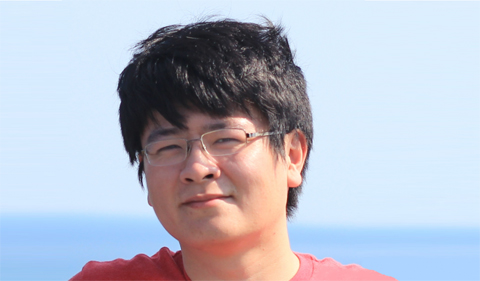By Amanda Biederman
NQPI editorial intern
On Feb. 14, the Ohio University campus was flooded with red hearts and sweet baked goods in celebration of Valentine’s Day. In Clippinger Hall, scientists convened to learn about Tiancong Zhu’s work on atomic-thin magnets that work at room temperature.
“It’s kind of a special day too; it’s Valentine’s Day for science,” Zhu said. “So it’s a special experience for me.”
Zhu, a Ph.D. student in Physics at The Ohio State University, was invited to present his research on magnetism in two-dimensional materials as a part of the Nanoscale and Quantum Phenomena Institute seminar series.
Magnetic ordering, or the reason that electrons inside materials organize themselves to produce magnetic field, is well-characterized in three-dimensional systems. In two-dimensional systems, however, the story is a bit more complex. In many two-dimensional systems, magnetism does not exist, Zhu said. This is due to the enhancement of thermal fluctuation within the system, which dispels the magnetic ordering.
Zhu constructs fine-tuned two-dimensional systems to overcome the effect of thermal fluctuations. Working with molecular beam epitaxy, he uses the technique to manipulate the atomic structure and surface environment of certain 2D materials to favor the generation of magnetic ordering.
Zhu and his co-workers demonstrated that ferromagnetism is observed at room temperature in the two-dimensional material. Ultimately, two-dimensional magnets may be used to advance technology in information storage, making thin, flexible and more energy efficient magnetic storage unit. In addition, these materials may be applied to create complex magnetic structures called magnetic skyrmions, which hold many promises for developing future computation.
Zhu was invited to Athens by Physics & Astronomy Professor and NQPI member Dr. Arthur Smith. While in Athens, Zhu met with students and faculty, discussing ideas that he said he hopes to pursue in future collaborations. Zhu expressed his gratitude to Smith and to the department for his invitation.
“There have been a lot of great discussions and a lot of good ideas for future research directions. I’ve learned a lot from people here,” Zhu said. “As a grad student, it’s uncommon to be invited to give a seminar. It’s a really great honor.”




















Comments